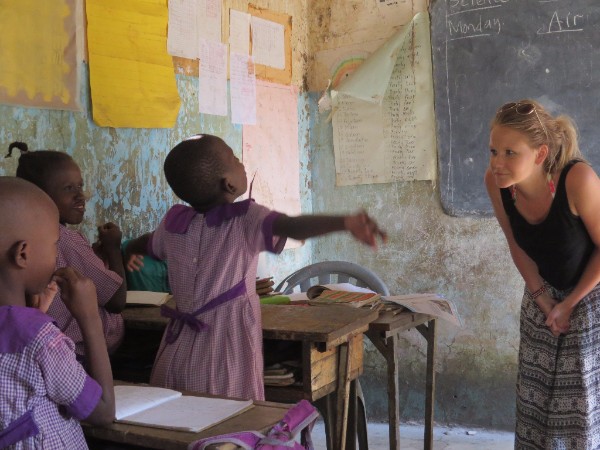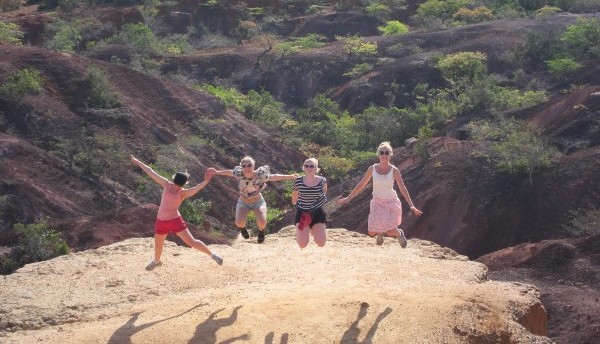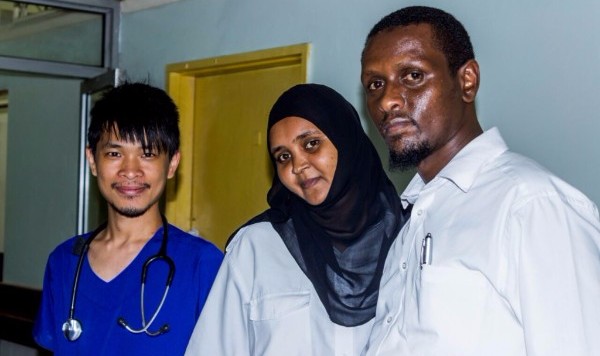 Visit Elective Africa website Visit Elective Africa website
|


|
|
|
| Elective Africa Monthly Newsletter |
 |
|
Happy New Month! Welcome to our monthly newsletter. This month on our destination focus we give you an insight into a placement in Kenya. We get you informed on the internal medicine rotation and also highlight Diabetes in detail even as the world will be marking World Diabetes day on November 14. Sophie Turner a student from Queens Belfast University shares her story on what mental health and psychiatric care in a developing world is like from her elective placement.In her words,"Different: The Psychiatry Experience." This is why! Back to top |
| The Psychiatry Elective Experience |
 |
|
I completed the first part of my elective at Port Reitz District Hospital in the mental health and substance abuse department. This was an interesting experience and very different from home. Despite it being the second largest psychiatric hospital in Kenya the facilities were extremely limited in terms of staff, medications and other necessities. While here I spent my time mainly contributing to the ward rounds, handing out medications and taking histories from the patients. The vast majority of patients had been admitted due to the effects of drugs and it was very interesting to hear all of their stories. I spent the first week very confused about who were students and who were members of staff. I then realized it was in fact nursing students who were just starting their psychiatric placement who were running the outpatient clinic. There were perhaps two qualified nurses working at any one time for approximately 60 inpatients. I was able to meet the only public psychiatrist in Mombasa region and arrange further meetings. This allowed me to see the medical side of treating the patients and we had many interesting discussions about the difference between psychiatry in the United Kingdom and Kenya. He worked in a large number of roles ranging from forensic psychiatry, running a methadone clinic and seeing general psychiatry inpatients. I have been interested in forensic psychiatry for a long time and I spent 2 days with the psychiatrist while he decided whether suspected criminals were fit to stand trial. It amazed me how quickly this could be done. It also allowed me to see some fascinating cases; including terror and murder suspects. The methadone clinic was something which could be directly compared to the United Kingdom. It is a relatively new government run programme and so unlike most of the health care in Kenya it is available free of charge. When the patients are first seen a general and specific history is taken by the nurse and then they are tested for many substances including: heroin, cocaine, methadone, cannabis, barbiturates, benzodiazepines and amphetamines. This to my opinion is a single most recent show of effort by the Government to improve the health services. I spent approximately a week of my elective in the Emergency Department of Coast General Provincial Hospital where I was mainly in Minor Injuries. It was clearly characterized by chronic shortage of staff and extremely busy. The majority of the work involved changing dressings, draining abscesses and suturing. Before my elective I had not done any suturing and so I gained a lot from this. While I was in A&E the most fascinating and worrying thing I saw was a male patient who had had his foot run over. The accident had happened a few days previously and his family had brought him into minors to have his dressing changed. The patient was unable to walk and appeared delirious. He was clearly very ill and in the UK would have immediately been treated for sepsis, one of the staff however thought he had "hysteria". After the discussion among the staff we convinced him this was not the case we were finally able to admit him. The rest of my elective I spent in pediatricians with emphasis on neonatology. The most difficult aspect here was the inability of parents to pay for their children's medications. A 9 year old female diagnosed with encephalitis was unable to be treated with IV acyclovir as her mother could not afford it. The contrast of this to my pediatrics placement at home was vast. A baby who had transposition of the great arteries was in a similar difficult situation, the closest place she could be taken for the operation was India, and again this was far more than the parents were able to afford. I really enjoyed my time in Kenya and I am extremely glad I chose to do my elective there despite many people discouraging me from the idea. It was an amazing experience and one which I learnt a lot. Sophie Turner Northern Ireland, Belfast, United Kingdom Back to top |
| Know your Destination: Kenya |
 |
|
Organizing a clinical rotation is the first major step for a healthcare student to shape their career and to stamp their intent in being a clinician who can make a difference. Where one chooses to go is a determinant of what they get to learn, the experience they get to have and the desired skills that they build. Taking a placement in a low or middle income country is a major step in processional development as well as impactful to the host population. In this article we explore the opportunities present for a unique experience in Kenya. Destination Snapshot Kenya brings with it a blend of diversity, vibrancy in culture, world class infrastructure in place and conceptualized notable experience. But that is not all, Kenya is the home of the world natural wonders; Wildebeest migration. Think of it as a safari hub. With her diverse culture and heritage, you can only look forward to leave as a friend rather than a visitor. It is not only about this breath taking natural beauty, but the most important, a transformative placement experience it offers. Health workforce views, Limited Human Resources Kenya has been making strides towards improving the health of her people by coming up with policies like KICK POLIO, Tuangamize Malaria etc. Despite this, the country still suffers from shortage of human resource the doctor patient ratio being 1:17000. This ration implies that the doctors have huge patients loads and that the facilities across all levels are busy with lots of activities and opportunities for learning from the variety of cases presented. The World Health Organization (WHO) also noted the worst cases of shortages of health workforce are experienced in the developing countries in Africa. With the low staffing levels, healthcare students get the chance to gain hands on experience and be impactful by using their skills to the benefit of the less disadvantaged communities. Diseases: Top Morbidity and Mortality Contributors The thought of interaction with phased out infections and tropical diseases is in itself a reason to experience an abroad placement. The three categories of causes of illness hospitalization and death in Kenya are:
With Malaria, Diseases of the Respiratory System (including pneumonia), Skin Diseases, diarrhea and accidents accounting for about 70 percent of total causes of morbidity. A rotation within the Kenyan health system is a sure way to learn different treatment procedures and the management of tropical diseases. Further the limited medical supplies and technology prompts the providers to be innovative in care delivery, Innovation and healthcare delivery is a key learning area in the placement abroad. Differentiated Healthcare System The main hospitals of placement being referral centers, the rotations are in a variety of departments. These include;surgery department , Accidents and Emergency department, Internal medicine ,Obstetrics and Gynecology and Pediatrics department. Within this departments you get to interact with various cadres of professionals, learn how teamwork is applied in care delivery as well as the roles of the different professionals in care giving and how they fit in delivery of complete care. Destination Kenya will allow you to interact with tropical diseases and phased out infections while utilizing limited resources; both human capital and infrastructure. At the highest level of organization, we are in your program destination abroad hence able to give you a meaningful learning experience. We take care of everything so that you can enjoy the experience and have a successful trip abroad. Back to top |
| A step wise guide to Internal Medicine Rotation |
 |
|
As one contemplates a healthcare placement the thought Is often aligned to what specialty should one consider. With Travel abroad presenting a uniqueness of a destination the cases presented are also unique and a rotation in eternal medicine during the elective or shadowing experience is a sure way to get the complete and total experience capped. Internal Medicine is a medical specialty dealing with the prevention, diagnosis and treatment of adult diseases. Normally the activities in the department involve the management of patients who have undifferentiated diseases. Within the developing world and for reasons of low information and accessibility of the health services the patients present the cases in advanced stages. With infectious diseases being a major morbidity contributor to this department, rotating and learning through this department is a very sure way to maximize the experience. Some of the activities that one is supposed to be involved in within this department and for a maximum gain include:
Desired Skills obtained from the rotations:
There is more to this rotation that just the hospital work, the top-grade mentoring and supervision by mentors well selected by elective Africa as well as the, global health tutorials ensure that you have the best experience out of your internal medicine placement. Elective Africa Healthcare electives is the surest way to experience something different. Back to top |
| The Rise of Chronic Illnesses: Diabetes Overview |
 |
|
Fact File
Typology of Diabetes The three main types of diabetes are: Diabetes Type 1: The body is unable to produce insulin to control blood sugar levels. Mainly caused by genetic susceptibility, viruses and dietary intakes. Diabetes Type 2: In this type the body does not produce enough insulin to for proper functioning, or the cells in the body do not react to insulin. This type contributes to 90% of all diabetic cases in the world. The main risk factors are overweight, physical inactivity and poor diet Gestational Diabetes Mainly affects females during pregnancy. It is prompted by high levels of glucose in the blood stream where the cells are unable to produce enough insulin to transport all the glucose into their cells. Prevention of diabetes With the projected rise in the number of incidences of diabetes, the surest ways to keep check is to prevent its occurrence. Among the cardinal checks for the preventive measures is:
A medical elective rotation or pre health shadowing enables one to experiences the management and treatment of chronic diseases such as diabetes in a unique health system with limit of resources and often limited specialized skills for treatment. Back to top |
|
|

 11 2016
11 2016